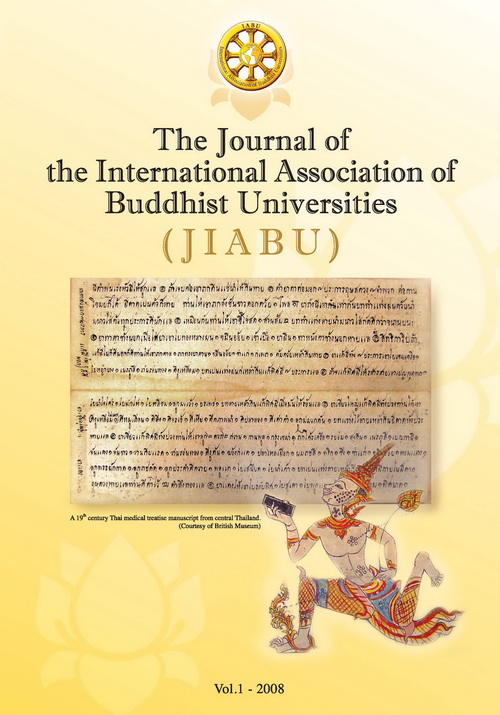Thinking of Foundations and Justification of Buddhist Ethics
Main Article Content
Abstract
Studies in Buddhist ethics is growing in popularity among
Buddhist scholars. A survey in more recent literature shows some
new trends in the field. Traditionally studies in Buddhist ethics
has been focused on the Pāli canon. An early instance of using
the term ‘ethics’ in relation to the Pāli canon is the translation of
Dhammasaṅgaṇī in 1900 by Mrs. C.A.F. Rhys Davids into English
as A Buddhist Manual of Psychological Ethics. Among those who
pioneered studies in Buddhist ethics as a full-fledged subject
are scholars such as S. Tachibana, O.H de A. Wijesekera, K.N.
Jayatilleke, and H. Saddhātissa. While Tachibana and Saddhātissa
were more interested in developing the basic principles and categories
of Buddhist ethics, the other two scholars, in particular, Jayatilleke
was interested in clarifying the meta-ethical issues.
Article Details
Views and opinions expressed in the articles published by The Journal of the International Association of Buddhist Universities (JIABU), are of responsibility by such authors but not the editors and do not necessarily reflect those of the editors.
References
Bodhi, Bhikkhu., 1995/2001, The Middle Length Discourses of
the Buddha, USA, Wisdom Publications.
________., 2000, The Connected Discourses of the Buddha, USA,
Wisdom Publications.
Dhamasīri, G., 1986, Fundamentals of Buddhist Ethics, Singapore,
The Buddhist Research Society.
Dhirasekera, Jotiya., 1982, Buddhist Monastic Discipline, Colombo,
Ministry of Higher Education Research Publication Series.
Harvey, Peter., 2000, An Introduction to Buddhist Ethics, Cambridge,
Cambridge University Press.
Jayatilleke, K. N., 1963/2004, Early Buddhist Theory of Knowledge,
New Delhi, Motilal Banarsidass.
________., 1972/1984, Ethics in Buddhist Perspective, Kandy,
Buddhist Publications Society.
Kalupahana, D. J., 1995, Ethics in Early Buddhism, Honolulu,
Hawaii, University of Hawaii Press.
Keown, Damien., 1992, The Nature of Buddhist Ethics, London,
Macmillan.
King, Winston L., 1964, In the Hope of Nibbāna, La sale,
Open Court.
Misra, G. S. P., 1984, Development of Buddhist Ethics, Delhi,
Munshiram Manoharlal.
Prebish, Charles., 2000, “From Monastic Ethics to Modern Society”
Contemporary Buddhist Ethics, ed., Damien Keown., 2000,
London, Rutledge, Pp.37-56.
Premasiri, P. D., 1976, “Interpretation of Two Principle Ethical
Terms in Early Buddhism” Sri Lanka Journal of
the Humanities, June, pp.63-74.
________., 1990, “Ethics” Encyclopaedia of Buddhism Vol. V,
Colombo, The Government of Sri Lanka.
Saddhātissa, H., 1970/2003, Buddhist Ethics, Boston, Wisdom
Publications.
Spiro, M. E., 1982, Buddhism and Society: A Great Tradition
and its Burmese Vicissitudes, Berkeley, University
of California Press. (2nd expanded edition)
Tachibana, S., 1926/1986, The Ethics of Buddhism, New Delhi,
Cosmo Publications.
Tatz, Mark., 1986, Asanga’s Chapter on Ethics with the Commentary
of Tsong-Kha-pa, The Basic path to Awakening,
The Complete Bodhisatva. Studies in Asian Thought and
Religion, Vol.4., New York, Lewiston.
Tilakaratne, Asanga., 2003, “Buddhist non-theism: Theory and
Practice”, Approaching the Dhamma: Buddhist Texts and
Practices in South and Southeast Asia, ed., Ann Blackburn
and Jeffrey Samuels, Seattle, USA, Pariyatti Publishers.
Pp.125-149.
Wijesekera, O. H. de A., Buddhist Ethics, Knowledge and
Conduct: Buddhist Contributions to Philosophy and Ethics,
Kandy, Buddhist Publications Society, pp.1-24.


